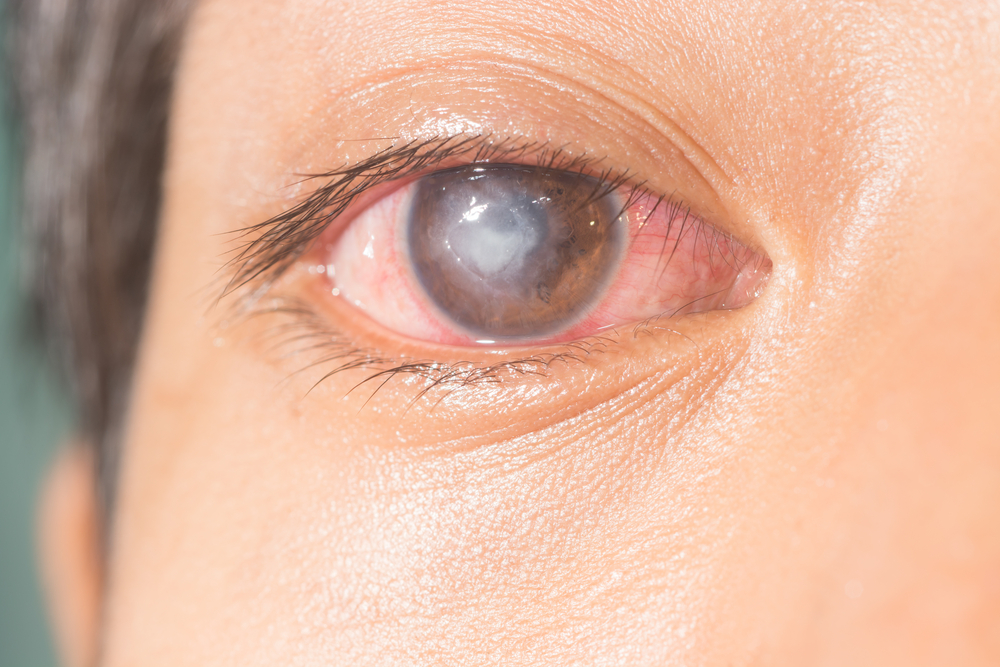
Neurotrophic keratitis is a degenerative condition affecting the cornea, the clear outer surface of the eye. It’s a rare and serious eye condition that often leads to decreased corneal sensitivity and impaired healing, resulting in persistent epithelial defects, corneal ulcers, and even perforation. Understanding this condition is the first step towards finding the right treatment and preventing further damage to the eyes.
The disease is often characterized by a decrease in corneal sensitivity or complete corneal anesthesia. This is due to the damage to the trigeminal nerve, the fifth cranial nerve that provides sensation to the face and motor functions such as biting and chewing. The cornea relies heavily on the trigeminal nerve for its health and function, making the nerve's damage a significant concern for the eyes' health.
Understanding neurotrophic keratitis also involves recognizing its potential complications. When left untreated, the condition can lead to serious eye complications, including blindness. It’s critical to understand this disease and seek immediate professional help at the first sign of symptoms.
Causes and Symptoms of Neurotrophic Keratitis
The primary cause of neurotrophic keratitis is damage to the trigeminal nerve. This damage can result from various factors, including surgical trauma, viral infections such as herpes zoster or herpes simplex, or certain neurological conditions such as multiple sclerosis or brain tumors. In some cases, the exact cause of the nerve damage remains unknown.
Symptoms of neurotrophic keratitis can vary greatly among patients but often include a feeling of something in the eye, blurred vision, redness, pain, and light sensitivity. Some people may also experience decreased or absent corneal sensitivity, meaning they are less able to feel touch or sensation in their eye. This lack of sensation can make it difficult for the body to detect and repair damage to the cornea, leading to further complications.
It's crucial to seek medical attention if you experience any of these symptoms. Early detection and treatment can prevent further damage and help preserve your vision.
Importance of Timely Neurotrophic Keratitis Treatment
Timely treatment for neurotrophic keratitis is crucial to prevent further damage to the cornea and maintain visual acuity. The disease typically develops in three stages, with each stage presenting an increasing risk to the eye's health and function. Without treatment, the disease can progress from mild to severe, leading to corneal scarring, infection, and even loss of vision.
The first stage of neurotrophic keratitis usually involves mild symptoms, such as dryness, irritation, and reduced corneal sensitivity. If not treated at this stage, the disease can progress to the second stage, where persistent epithelial defects occur. In the final stage, the patient may experience corneal ulcers, melting, and perforation.
There's no specific timeline for the progression of neurotrophic keratitis, as it varies from patient to patient. However, it's essential to take any symptoms seriously and seek professional help to start treatment as soon as possible.
Different Stages of Neurotrophic Keratitis
There are three stages in the progression of neurotrophic keratitis. In the first stage, also known as the epithelial stage, the disease presents with mild symptoms such as dryness, reduced corneal sensitivity, and occasional blurred vision. During this stage, the cornea may appear hazy and have a rough surface due to dryness and lack of tears.
The second stage, or stromal stage, is characterized by persistent epithelial defects. These are areas of the cornea where the outermost layer of cells has been damaged or lost. These defects can make the cornea more susceptible to infection and further damage.
The final stage, or ulcerative stage, is the most severe. At this stage, corneal ulcers and melting may occur. The cornea may become thin and start to dissolve, leading to a serious risk of perforation. It's essential to seek treatment before the condition reaches this stage to avoid severe complications and preserve vision.
Modern Treatment Options for Neurotrophic Keratitis
Modern treatment options for neurotrophic keratitis aim to promote healing of the cornea, alleviate symptoms, and prevent progression of the disease. The choice of treatment largely depends on the stage of the disease and the patient's overall health.
In the early stages of the disease, treatment typically involves the use of lubricating eye drops and ointments to alleviate dryness and discomfort. If these measures are insufficient, additional treatments such as bandage contact lenses or punctal plugs may be considered to keep the cornea moist and protect it from further damage.
In the later stages of neurotrophic keratitis, more aggressive treatments may be necessary. This can include the use of topical growth factors or serum eye drops to promote corneal healing. Additionally, surgical interventions may be considered in advanced cases.
Surgical Treatments for Advanced Neurotrophic Keratitis
In advanced cases of neurotrophic keratitis, surgical interventions may be necessary. This can include procedures such as amniotic membrane transplantation, which involves placing a thin layer of tissue over the cornea to promote healing and reduce inflammation.
Another surgical option is tarsorrhaphy, a procedure that partially closes the eyelids to protect the cornea and keep it moist. In severe cases, a corneal transplant may be necessary. However, this is considered a last resort and is only performed when other treatment options have failed.
While surgical treatments can be effective, they also come with risks and complications. Therefore, they are typically reserved for advanced cases of neurotrophic keratitis where other treatments have been unsuccessful.
The Role of Eye Drops in Neurotrophic Keratitis Treatment
Eye drops play a crucial role in the treatment of neurotrophic keratitis. They can provide relief from symptoms, promote healing, and prevent further damage to the cornea. There are several types of eye drops that can be used, depending on the stage of the disease and the patient's symptoms.
Lubricating eye drops and ointments are commonly used to alleviate dryness and irritation. These can help keep the cornea moist and reduce discomfort. In addition, topical antibiotics may be prescribed to prevent or treat infections.
In more advanced stages of the disease, eye drops containing growth factors or autologous serum can be used. These eye drops are designed to promote healing of the cornea and reduce inflammation. They can be effective in treating persistent epithelial defects and ulcers.
Conclusion
The future of neurotrophic keratitis treatment looks promising, with ongoing research and advancements in technology. New therapies are being studied that aim to restore corneal sensitivity and promote healing. In addition, advances in surgical techniques and the development of new bioengineered materials could provide more effective treatment options for advanced cases.
Despite these advancements, the importance of early detection and treatment cannot be overstated. If you experience symptoms of neurotrophic keratitis, seek immediate medical attention. Timely treatment can greatly improve the prognosis and help preserve your vision.
While neurotrophic keratitis can be a challenging condition to manage, understanding the disease and its treatment options is the first step towards maintaining eye health and preserving vision.
For more information on treating neurotrophic keratitis, contact Westchester Eyes at our clinic in Yonkers, New York, for an in-person consultation. We provide high-quality eye care products and services. Call 914-586-EYES (3937) to set an appointment today.









